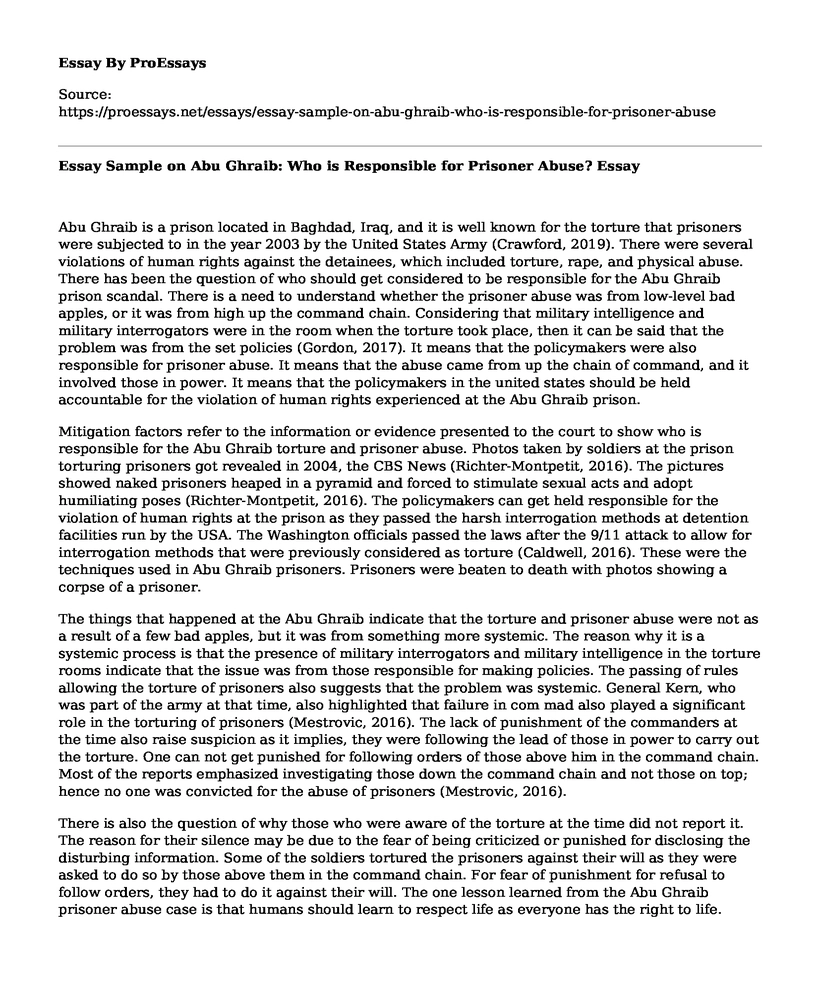Abu Ghraib is a prison located in Baghdad, Iraq, and it is well known for the torture that prisoners were subjected to in the year 2003 by the United States Army (Crawford, 2019). There were several violations of human rights against the detainees, which included torture, rape, and physical abuse. There has been the question of who should get considered to be responsible for the Abu Ghraib prison scandal. There is a need to understand whether the prisoner abuse was from low-level bad apples, or it was from high up the command chain. Considering that military intelligence and military interrogators were in the room when the torture took place, then it can be said that the problem was from the set policies (Gordon, 2017). It means that the policymakers were also responsible for prisoner abuse. It means that the abuse came from up the chain of command, and it involved those in power. It means that the policymakers in the united states should be held accountable for the violation of human rights experienced at the Abu Ghraib prison.
Mitigation factors refer to the information or evidence presented to the court to show who is responsible for the Abu Ghraib torture and prisoner abuse. Photos taken by soldiers at the prison torturing prisoners got revealed in 2004, the CBS News (Richter-Montpetit, 2016). The pictures showed naked prisoners heaped in a pyramid and forced to stimulate sexual acts and adopt humiliating poses (Richter-Montpetit, 2016). The policymakers can get held responsible for the violation of human rights at the prison as they passed the harsh interrogation methods at detention facilities run by the USA. The Washington officials passed the laws after the 9/11 attack to allow for interrogation methods that were previously considered as torture (Caldwell, 2016). These were the techniques used in Abu Ghraib prisoners. Prisoners were beaten to death with photos showing a corpse of a prisoner.
The things that happened at the Abu Ghraib indicate that the torture and prisoner abuse were not as a result of a few bad apples, but it was from something more systemic. The reason why it is a systemic process is that the presence of military interrogators and military intelligence in the torture rooms indicate that the issue was from those responsible for making policies. The passing of rules allowing the torture of prisoners also suggests that the problem was systemic. General Kern, who was part of the army at that time, also highlighted that failure in com mad also played a significant role in the torturing of prisoners (Mestrovic, 2016). The lack of punishment of the commanders at the time also raise suspicion as it implies, they were following the lead of those in power to carry out the torture. One can not get punished for following orders of those above him in the command chain. Most of the reports emphasized investigating those down the command chain and not those on top; hence no one was convicted for the abuse of prisoners (Mestrovic, 2016).
There is also the question of why those who were aware of the torture at the time did not report it. The reason for their silence may be due to the fear of being criticized or punished for disclosing the disturbing information. Some of the soldiers tortured the prisoners against their will as they were asked to do so by those above them in the command chain. For fear of punishment for refusal to follow orders, they had to do it against their will. The one lesson learned from the Abu Ghraib prisoner abuse case is that humans should learn to respect life as everyone has the right to life.
References
Caldwell, R. A. (2016). Prologue: So What Really Happened at Abu Ghraib?. In Fallgirls (Open Access) (pp. 23-44). Routledge.
Crawford, J. L. (2019). The Abu Ghraib Trials, 15 Years Later. Army Law., 48.
Gordon, A. F. (2017). Abu Ghraib: imprisonment and the war on terror. The Criminology of War, 249-266.
Mestrovic, S. G. (2016). Trials of Abu Ghraib: An Expert Witness Account of Shame and Honor. Routledge.
Richter-Montpetit, M. (2016). Militarized masculinities, women torturers, and the limits of gender analysis at Abu Ghraib. In Researching War (pp. 92-116). Routledge.
Cite this page
Essay Sample on Abu Ghraib: Who is Responsible for Prisoner Abuse?. (2023, Apr 08). Retrieved from https://proessays.net/essays/essay-sample-on-abu-ghraib-who-is-responsible-for-prisoner-abuse
If you are the original author of this essay and no longer wish to have it published on the ProEssays website, please click below to request its removal:
- Supreme Court Declines to Hear Telecom
- Probable Cause and the Fourth Amendment Research
- How Do the Agencies of the Criminal Justice System Work Together to Provide Justice?
- Summary of Saba Mahmood Main Points: Conformist Secularism Notion of Euro-Western
- Argumentative Essay on The Effects of Arming Teachers in Schools
- Essay on Fairness & Equality: Defining Distributive Justice & Its Impact
- Essay Sample on Mental Illness & Criminal Justice: Over 1.2M Affected Annually







